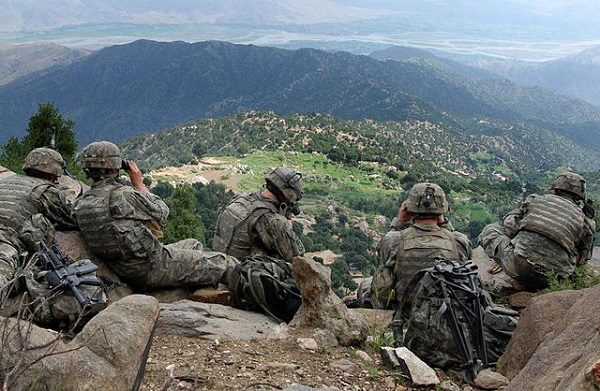
American elites talk a lot about peace. But what they really love are wars. The media elites covering President Trump’s recent speech on Afghanistan were praiseworthy of Trump’s sober tone even though, in reality, the speech heralded open-ended war. No troop levels were announced. No timeline was provided.
No one knows the cost in blood and treasure. But that did not stop the pursuit of a quixotic idea that the U.S. will kill its way out of the problem of terrorism in Afghanistan.
The Cost of Wars Project at Brown University estimates that since 9-11, America’s war efforts in Afghanistan total $2 trillion. Adding war spending in Iraq and Pakistan to the equation puts the total at $5 trillion, nearly 25 percent of U.S. GDP in 2016. The total death toll in Afghanistan is estimated at over 111,000. More than 2,300 American soldiers made the ultimate sacrifice.
While more than 42,000 Taliban and other militants have been killed, over 35,000 Taliban fighters still remain in action. By some estimates, there are more Taliban militants today than at the start of the U.S. war efforts about 16 years ago. And, despite years of heavy American footprint in Afghanistan, the Taliban today control 37 percent of the country.
So, Trump’s logic is what could not be achieved with over 100,000 U.S. troops, can now be achieved with a few thousand more troops beyond the 8,500 still stationed there?
In his speech, the Commander-in-Chief said, “We are not nation-building again. We are killing terrorists.” What about the more than 40,000 we killed so far? Why did that not end terrorism? He went on to assert that his new approach will be, “the integration of all instruments of American power—diplomatic, economic, and military—toward a successful outcome.”
Did the previous two presidents not try something similar? In fact, many points of Trump’s speech closely resembled Obama’s 2009 speech on Afghanistan.
Besides the fact that 12 million fewer people watched Trump’s speech compared to that of Obama’s speech eight years ago, perhaps the biggest departure was Trump’s strident language about Pakistan. Trump correctly diagnosed that a large number of terrorist organizations are active in Pakistan and Afghanistan. He called it, “the highest concentration in any region anywhere in the world.”
Why then does his Muslim-ban (euphemistically called the travel-ban) not include Pakistan and Afghanistan?
Pakistan’s long history of flirting with terrorist organizations is indeed a problem but U.S. troops also use Pakistan as an entry point into Afghanistan. Without Pakistan’s cooperation, the “new” Afghanistan strategy will be just as successful as the past ones, which is to say not very. Asking Pakistan to, “demonstrate its commitment to civilization, order and to peace,” may get a few applause lines across the border in India but will not make the people of Pakistan endear to American efforts.
It is noteworthy that Pakistanis have sacrificed their lives standing up to Taliban and the myriad of other extremists that have tormented their region.
Pakistan’s love-hate relationship with extremists is rooted in its own regional struggle with neighboring India. Previous administrations have always tried to be nuanced about this delicate power struggle between two nuclear armed nations. Abandoning this strategic patience seems like a dangerous turn towards more militarism in an already volatile region.
Moreover, how can Trump bring diplomatic pressure to bear while at the same time leaving key positions in the State Department unfilled and cutting State Department budget at the same time?
The Trump speech has left many unanswered questions. Trump vowed that, “from now on, victory will have a clear definition.” But he never defined what victory will actually look like. As long as America’s war efforts remain shouldered by a disproportionately small group of volunteers and as long as politicians keep selling that we can fight our existential war without asking American’s for any sacrifice in treasure (taxes), militarism will continue to drain our blood and treasure without bringing us closer to any meaningful resolution.
Parvez Ahmed is professor of finance at University of North Florida














